Modules in Java? Finally! (OpenJDK 9 Jigsaw, JSR376)
- 1. Modules in Java? Finally! Jigsaw
- 2. What is this talk all about? (Agenda) ? This talk is for a very important new feature in Java SE 9 ? Code named Jigsaw, this feature modularizes the Java SE platform ? Agenda ? Who am I? ? Problems with monolithic java ? Solutions in Java SE 9 ? Jigsaw in examples ? JDK9 Early Access with Jigsaw ? A modular example, transitivity ? Services and Custom JREs
- 3. Who am I? @mihailstoynov ? By day: sty.bz ? Java ? Security audits, web pen testing, sec tools ? Training, travelling -> ? By night: jug.bg ? Java evangelism ? Submitting Java patches, writing manuals, early adoption ? jprime.io ¨C organize big java conf in Sofia ? Co-authoring books, university courses ? Weekends ? Bikes
- 4. Problems with a monolithic Java
- 5. Why do we need jigsaw? 1 ? "Small" devices can run Java, but JRE size is a problem ? Clouds don't like wasting resources loading a large JRE full of unnecessary classes
- 6. Why do we need jigsaw? 2 ? JDK is messy
- 7. Why do we need jigsaw? 3 ? Classpath is messy
- 8. Why do we need jigsaw? 4 ? People use sun.misc.* or *.internal.* APIs, which was not intended ? Securing the platform is difficult if everyone can read anything
- 9. Problem: source code is monolithic 201 ? JRE source code itself is monolithic ¨C it has no modules ? Solution (JEP 201) ? Reorganize mercurial repo ? src/share/classes/java/lang/Object.java src/share/native/java/lang/Object.c -> src/java.base/share/classes/java/lang/Object.java src/java.base/share/native/java/lang/Object.c ? Rename solaris to unix ? Compile repo -> compile modules ? Enforce module boundaries at build time
- 10. Problem: JRE code is not modular 200 ? JRE itself is not using modules ? Solution (JEP 200) ? Create modules for code governed by JCP (module java.base) ? Modules for other code in the JDK (module jdk.javadoc ) ? Define requires public ? All reside in $JAVA_HOME/jmods
- 11. Offtopic: jmods are not for you ? .jmod format was created for the platform ? can have native code ? Overall very cool ? $ jmod list $JAVA_HOME/jmods/java.base.jmod --list of classesˇŞ- --native code too (so, dylib)-- ? $ jmod describe $JAVA_HOME/jmods/java.base.jmod ? Describes what it exports, what it conceals, who it exports it too and stuff
- 12. Problem: JRE code is not modular 200 Check out the java.compact{1..3}
- 13. Problem: Internal APIs 260 ? Many are using internal APIs (example: sun.misc.Unsafe) ? Solution (JEP 260) ? Provide safe alternative (other JEPs) ? Non critical (Base64Decoder) are encapsulated or deprecated ? Critical APIs (Unsafe) are rewritten and encapsulated (JEP 259)
- 14. Problem: JRE is too big 282 ? The JRE is too big ? Some distributions are over 100MB ? In mobile devices: CPU is strong enough for java, but little space ? Solution (JEP 282) ? In Java 9 we can create a "custom runtime image" ? A tool that can do that is called jlink ? The same tool can also add our application modules ? Only the ones we need
- 15. Problem: Put it all together 261 (376) ? JSR 376 (Java Platform Module System) proposes changes and extensions to ? the Java programming language ? the Java virtual machine ? the standard Java APIs ? JSR 376 Will be implemented in JEP 261 ? JCP = Java Community Process (IBM, SAP, RedHat "participate") ? JSR = Java Specification Request (specifies new standards, JCP) ? JEP = Java Enhancement Process (implementations, non JCP)
- 16. More problems ? The base classes had a lot of cyclic dependencies ? They had to be unwounded ? It took several years to specify the module format ? Several abandoned formats so far ? It took several years to specify the scope of Jigsaw ? For example no dynamic loading/unloading ? No luck for OSGi ? Mark Reinhold said that this will not be implemented soon
- 18. JDK9 Early Access with Jigsaw ? jdk9.java.net/jigsaw
- 19. pre-Java9 class visibility ? Until Java 9 a class had the following visibility "levels": ? public ? friendly, package private (includes protected) ? protected ? private
- 20. post-Java9 class visibility ? In Java 9 new levels of "public" are provided: ? public ? To all ? To some modules (we specify them) ? Only to our module ? friendly, package private (includes protected) ? protected ? private
- 21. Creating a simple module bz.sty.logger ? Important note: just like packages, module names are dir names ? module-info.java module bz.sty.logger { requires java.base; //implicit exports bz.sty.logger; } ? Logger.java package bz.sty.logger; public class Logger { public void log(String message) { System.out.println("Logger: "+message); } } ? Compilation $ javac -d mods/ Logger/bz.sty.logger/bz/sty/logger/Logger.java Logger/bz.sty.logger/module-info.java
- 22. Referencing the log module bz.sty.main ? module-info.java: module bz.sty.main { requires bz.sty.logger; //implicit //exports bz.sty.logger; } ? Program.java public class Program { public void main(String... args) { new Logger.log("Hello, World!"); } } ? Compilation $ javac -d mods -modulepath mods/ Main/bz.sty.main/bz/sty/main/Program.java Main/bz.sty.main/module-info.java
- 23. Compile multiple modules at once $ javac -d mods/ -modulesourcepath Logger/:Main/ $(find Logger/ Main/ -name *.java) ? What did we do here? ? All source paths are in modulesourcepath ? We use a bit of bash magic to add all java files ? All should be deployed
- 24. Running a multi module app $ java -modulepath mods/ -m bz.sty.main/bz.sty.main.Program Logger: Hello, World!
- 25. Support for Jigsaw ? Maven, Gradle ? None ? IntelliJ IDEA, Eclipse ? None ? I use IDEA modules and duplicate the dependencies ? NetBeans ? http://wiki.netbeans.org/JDK9Support ? But I don't like it, so we won't use it ? When will it be released ? With Java SE 9 ? Used to be mid'2016, jigsaw delayed it to Q1'2017 ? http://www.java9countdown.xyz/ ? Nobody believes it will be on time
- 26. Packaging $ mkdir mlib $ jar --create --file=mlib/bz.sty.logger@2.0.jar --module-version=199.0 -C mods/bz.sty.logger . $ jar --create --file=mlib/bz.sty.main.jar --main-class=bz.sty.main.Program -C mods/bz.sty.main . $ java -mp mlib -m bz.sty.main Logger: Hello, World!
- 27. What's in the jar? $ jar --print-module-descriptor --file=mlib/bz.sty.main.jar bz.sty.main requires bz.sty.logger requires mandated java.base conceals bz.sty.main main-class bz.sty.main.Program $ jar --print-module-descriptor --file=mlib/bz.sty.logger@2.0.jar bz.sty.logger@199.0 requires java.base exports bz.sty.logger
- 28. Transitivity ("requires public") ? We create a new module, called prettylogger ? public class PrettyLogger extends Logger ? We change dependencies so that main ? prettylogger ? logger ? The new main: public class Program { public static void main(String... args) { Logger logger = new PrettyLogger(); logger.log("Hello, World!"); } } ? module-info.java module bz.sty.prettylogger { requires public bz.sty.logger; exports bz.sty.prettylogger; }
- 29. Quering the JDK module system ? $ java ¨Clistmods ? List all modules in the JDK ? Shows the version ? $ jmod describe $JAVA_HOME/jmods/java.base.jmod ? Shows a very detailed description ? $ jmod list $JAVA_HOME/jmods/java.base.jmod ? A list of all classes in the jmod
- 31. Services ? Services allow for loose coupling between service consumers modules and service providers modules ? Since Java SE 6, ServiceLoader API allows extending applications ? SL detects implementations of an interface and loads them ? This solution still works nicely with Java modules ? It is now sufficient the modules to be present on module-path ? Basically we define an interface/abstract class and we state that we depend on their implementations ? we cant run without an implementation ? Other modules implement that interface/abstract class ? All is defined in the module-info
- 32. The module and the provider module bz.sty.pluggablelogger { exports bz.sty.pluggablelogger; exports bz.sty.pluggablelogger.spi; uses bz.sty.pluggablelogger.spi.PluggableLoggerProvider; } public abstract class PluggableLoggerProvider { protected PluggableLoggerProvider() { } public abstract PluggableLogger getPluggableLogger(); }
- 33. PluggableLogger public abstract class PluggableLogger { public static PluggableLogger get() { ServiceLoader<PluggableLoggerProvider> sl = ServiceLoader.load(PluggableLoggerProvider.class); Iterator<PluggableLoggerProvider> iter = sl.iterator(); if (!iter.hasNext()) throw new RuntimeException("No service providers found!"); PluggableLoggerProvider provider = iter.next(); return provider.getPluggableLogger(); } protected PluggableLogger() { } public abstract void log(String message); }
- 34. SuperLogger (implementing module) module bz.sty.superlogger { requires bz.sty.pluggablelogger; exports bz.sty.superlogger; provides bz.sty.pluggablelogger.spi.PluggableLoggerProvider with bz.sty.superlogger.SuperLoggerProvider; } public class SuperLoggerProvider extends PluggableLoggerProvider { public PluggableLogger getPluggableLogger() { return new SuperLogger(); } } public class SuperLogger extends PluggableLogger { public void log(String message) { System.out.println("SuperLogger: " + message); } }
- 35. Running it all together $ javac -d mods ¨Cmodulesourcepath PluggableLogger:PluggableLoggerImpl:PluggableLoggerMain $(find Pluggable* -name *.java) $ jar --create --file=X.jar ¨CC mods/mdl . $ java -mp mlib/ -m bz.sty.pluggableloggerexample SuperLogger: Hello, World! $ java -Xdiag:resolver
- 36. Jigsaw in examples Custom JREs (Jlink)
- 37. Create a custom JRE ? And now a drum roll for the coolest feature ? We hinted that it's now possible to create custom JREs ? The tool is called JLINK ? jlink takes the smallest set of needed jars and jmods and creates a new JRE in a dir. Very WOW
- 38. jlink in action (example) $ jlink --modulepath $JAVA_HOME/jmods:mlib --addmods bz.sty.pluggablelogger, bz.sty.superlogger, bz.sty.pluggableloggerexample --output CustomVM $ CustomVM/bin/java -listmods $ CustomVM/bin/java -m bz.sty.pluggableloggerexample SuperLogger: Hello, World! $ du ¨Csh CustomVM/ 30M $ du -sh $JAVA_HOME 408M
- 39. Stuff we didn't discuss, but it's important ? Jdeps ? A tool to check if you use internal APIs ? Unnamed modules ? All old jars ? Automatic modules ? Making old jars to modules ? Migrating an application gradually ? Not difficult at all, but only after IntelliJ/Eclipse and maven support ? The console is difficult ? Mixing --classpath and --modulepath ? It takes some getting used to
Editor's Notes
- #4: SOFIA JUG ?! OPEN JUG.bg

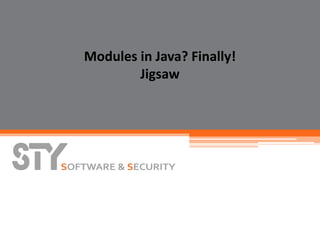
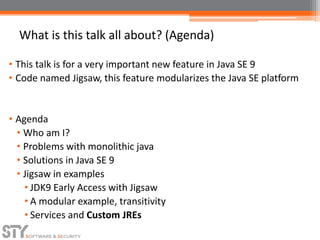
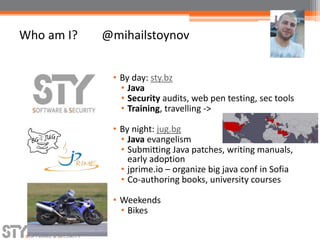
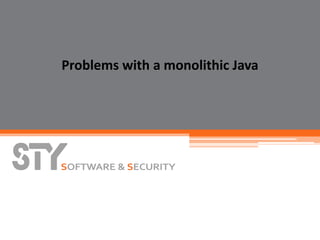
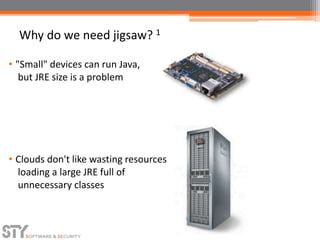
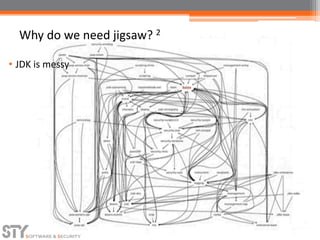
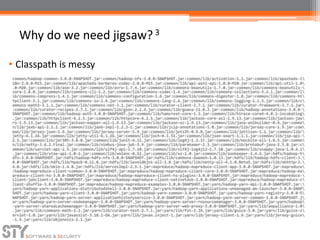
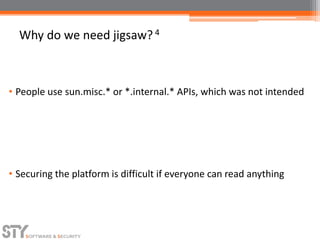
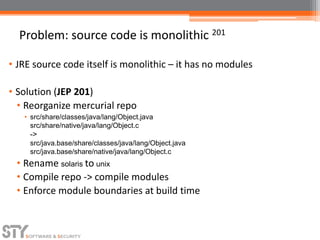
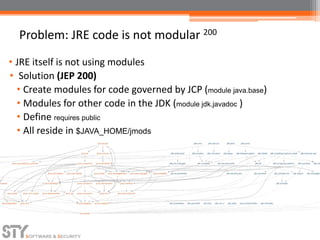
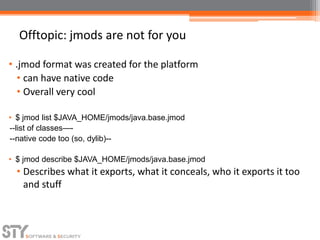
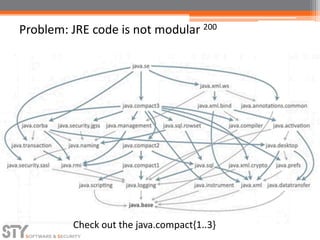
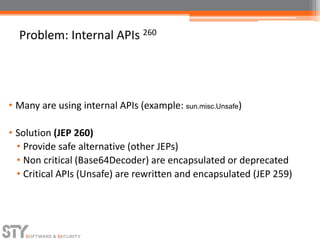
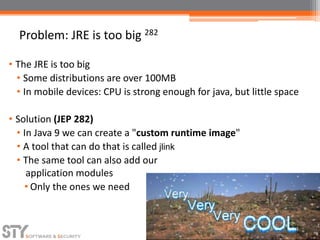
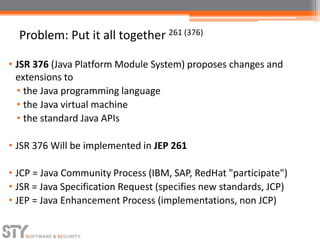
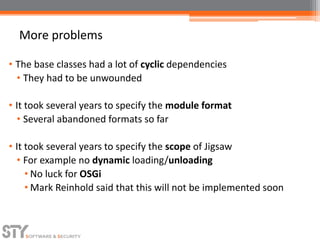
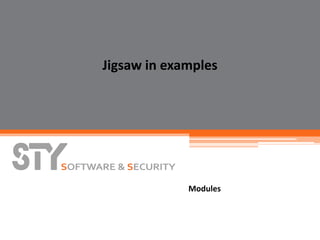
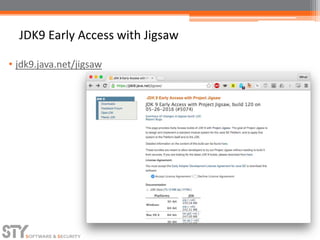
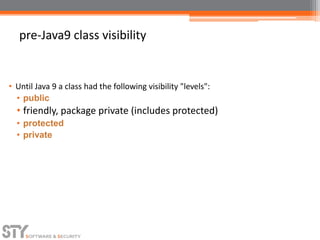
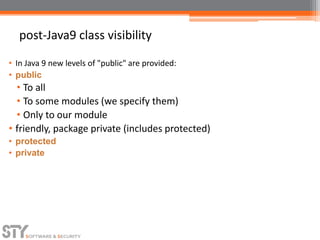
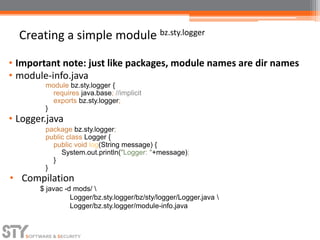
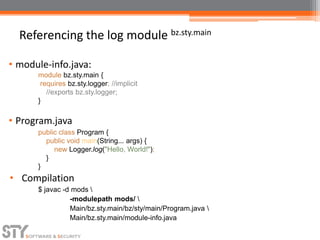
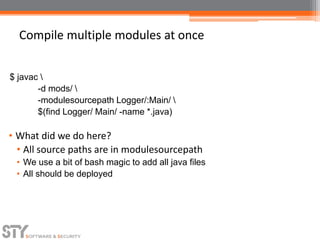
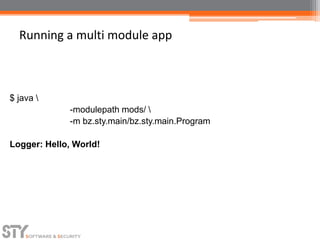
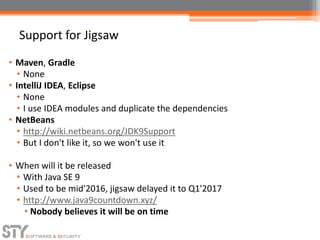
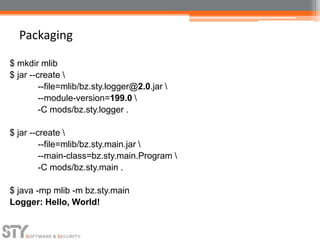
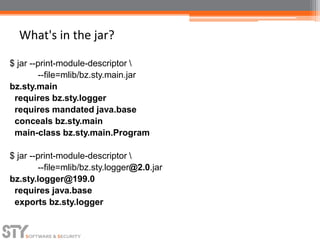
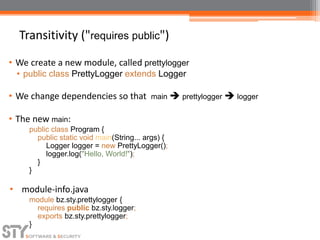
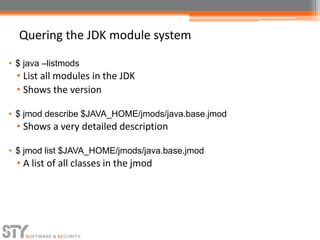
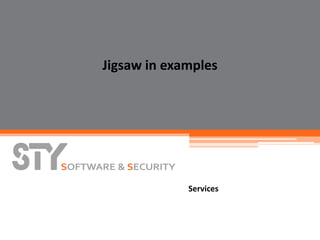
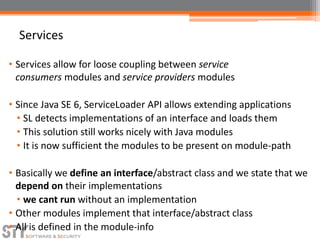
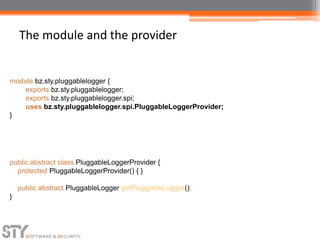
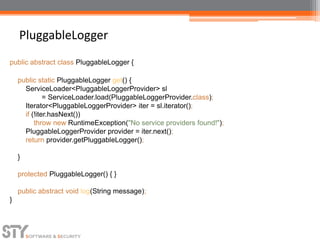
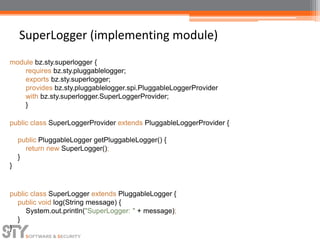
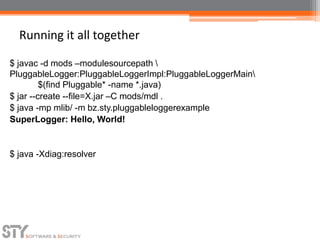
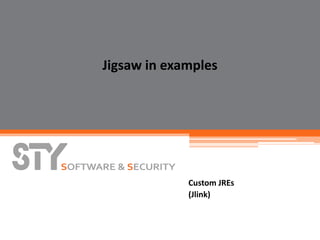
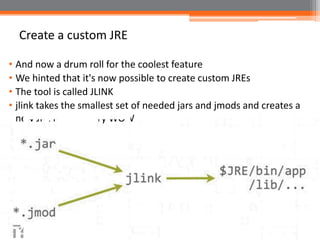
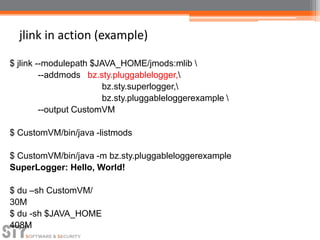
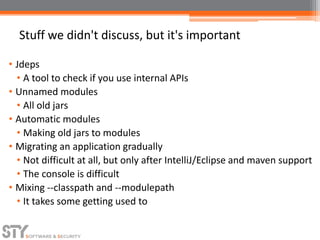
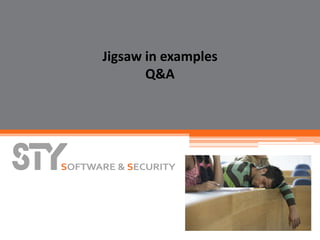




![Faster java ee builds with gradle [con4921]](https://cdn.slidesharecdn.com/ss_thumbnails/fasterjavaeebuildswithgradlecon4921-160927042155-thumbnail.jpg?width=560&fit=bounds)






























































